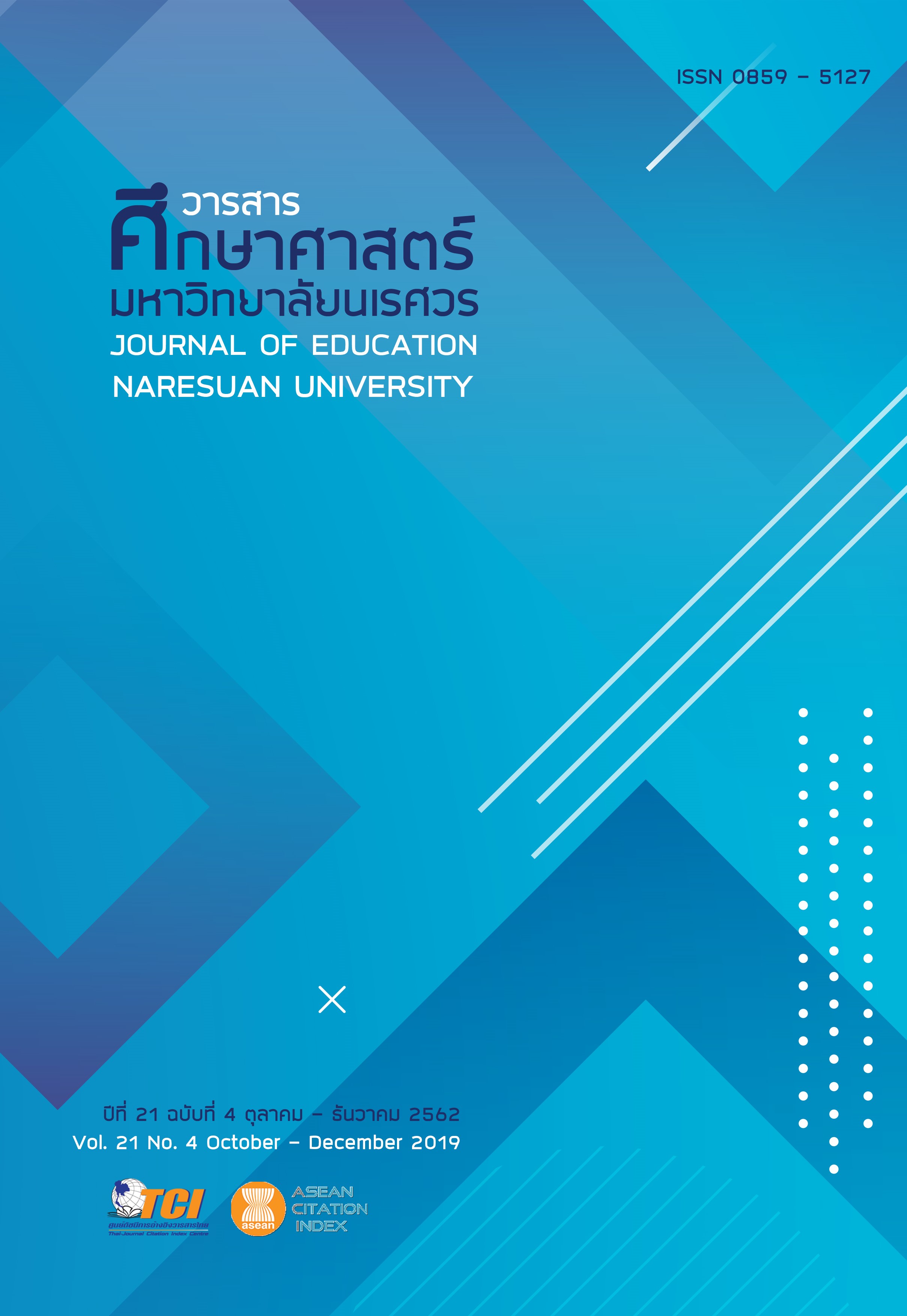การพัฒนาระบบการเรียนการสอนออนไลน์แบบสปอค (SPOC) รายวิชาศึกษาทั่วไป สำหรับมหาวิทยาลัยนเรศวร (A DEVELOPMENT OF AN INSTRUCTIONAL SYSTEM ON SMALL PRIVATE ONLINE COURSE FOR GENERAL EDUCATION COURSE FOR NARESUAN UNIVERSITY)
Main Article Content
บทคัดย่อ
การวิจัยนี้มีวัตถุประสงค์เพื่อพัฒนาระบบการเรียนการสอนออนไลน์แบบสปอค (SPOC) รายวิชาศึกษาทั่วไป สำหรับมหาวิทยาลัยนเรศวร มีขั้นตอนการวิจัย ได้แก่ 1) ศึกษาองค์ประกอบของระบบการเรียนการสอนออนไลน์แบบสปอคและความต้องการของอาจารย์ผู้สอนในการใช้ระบบ 2) สร้างและประเมินองค์ประกอบของระบบโดยผู้เชี่ยวชาญด้วยเทคนิคการสนทนากลุ่ม 3) ทดลองใช้ระบบกับนิสิตระดับปริญญาตรี ภาคปกติ ที่ลงทะเบียนเรียนในรายวิชาศึกษาทั่วไป ภาคเรียนฤดูร้อน ปีการศึกษา 2559 4) ประเมินระบบโดยนิสิตและผู้ทรงคุณวุฒิ กลุ่มตัวอย่างเป็นนิสิตระดับปริญญาตรี ที่ลงทะเบียนเรียนรายวิชาศึกษาทั่วไป มหาวิทยาลัยนเรศวร ในภาคเรียนฤดูร้อน ปีการศึกษา 2559 จำนวน 30 คน เครื่องมือที่ใช้ในการวิจัย ได้แก่ ระบบการเรียนการสอนออนไลน์แบบสปอคแบบประเมินทักษะการแก้ปัญหา แบบทดสอบวัดผลสัมฤทธิ์ทางการเรียน แบบประเมินความพึงพอใจ และแบบสอบถามความเหมาะสมของระบบ วิเคราะห์ข้อมูลโดยใช้ความถี่ ร้อยละ ค่าเฉลี่ย ส่วนเบี่ยงเบนมาตรฐาน และสถิติทดสอบทีแบบไม่อิสระ ผลการวิจัย พบว่า 1) องค์ประกอบของระบบการเรียนการสอน 1.1) องค์ประกอบตามหลักของทฤษฎีระบบ มี 5 องค์ประกอบ ได้แก่ สภาพแวดล้อมหรือบริบท ปัจจัยนำเข้า กระบวนการ ผลลัพธ์ และ ข้อมูลย้อนกลับ และ 1.2) อาจารย์ผู้สอนมีความต้องการที่จะใช้ระบบการเรียนการสอนออนไลน์แบบสปอค ร้อยละ 46 และเห็นด้วยที่คณะกรรมการบริหารเครือข่ายศึกษาทั่วไปแห่งประเทศไทยมีแนวคิดที่จะพัฒนาการเรียนการสอนในรายวิชาศึกษาทั่วไปผ่านออนไลน์แบบสปอค ร้อยละ 61 2) ระบบการเรียนการสอนออนไลน์แบบสปอคใช้แนวคิดการเรียนการสอนแบบผสมผสานระหว่างออนไลน์และการเผชิญหน้า มี 5 องค์ประกอบหลัก ได้แก่ 2.1) บริบทหมวดวิชาศึกษาทั่วไป 2.2) ปัจจัยนำเข้า 2.3) กระบวนการเน้นการเรียนรู้โดยใช้ปัญหาเป็นฐาน 2.4) ผลลัพธ์ 2.5) ข้อมูลย้อนกลับ ผู้เชี่ยวชาญประเมินระบบการเรียนการสอนออนไลน์แบบสปอค มีคุณภาพระดับดี และผลการทดลองใช้ระบบการเรียนการสอนออนไลน์แบบสปอคมีประสิทธิภาพ 80.80/82.00 3) ผลการใช้ระบบการเรียนการสอนออนไลน์แบบสปอค ทำให้ 3.1) นิสิตมีทักษะการแก้ปัญหาหลังเรียนสูงกว่าก่อนเรียน อย่างมีนัยสำคัญทางสถิติที่ระดับ .05 3.2) นิสิตมีผลสัมฤทธิ์ทางการเรียนหลังเรียนสูงกว่าก่อนเรียน อย่างมีนัยสำคัญทางสถิติที่ระดับ .05 4) ผลการประเมินระบบการเรียนการสอนออนไลน์แบบสปอค พบว่า 4.1) นิสิตมีความพึงพอใจต่อการใช้ระบบอยู่ในระดับมาก 4.2) ผู้ทรงคุณวุฒิประเมินระบบการเรียนการสอนออนไลน์แบบสปอค อยู่ในระดับเหมาะสมมากที่สุด และรับรองระบบการเรียนการสอนแบบสปอค คิดเป็นร้อยละ 100
A DEVELOPMENT OF AN INSTRUCTIONAL SYSTEM ON SMALL PRIVATE ONLINE COURSE FOR GENERAL EDUCATION COURSE FOR NARESUAN UNIVERSITY
The purpose of this research was to develop an instructional system Small Private Online Course (SPOC) for general education courses for Naresuan University. The research procedure included: 1) studying the components of SPOC and the instructor's requirements for system use; 2) creating and evaluating the system components by experts using a focus group technique; 3) experimenting with undergraduate students who registered for general education courses at Naresuan University in the summer semester of academic year 2016; and 4) evaluating the system by the students and the experts. The samples were 30 undergraduate students who registered for general education course at Naresuan University in the summer semester of academic year 2016. The tools used in this research were the SPOC teaching system, the problem-solving assessment, the achievement evaluation form, the satisfaction evaluation form, and the evaluation form of the system appropriateness. The data were analyzed using frequency, percentage, mean, standard deviation and t-test. The findings were as follows: 1) the components of the learning/teaching system; 1.1) the main were environment or context, input, process, output and feedback, 1.2) The instructors needed 46% of online instructional system and 61% of them agreed with the idea that the Board of the General Education Network of Thailand would develop teaching and learning of online education through the system. 2) The system had the concept of integrated teaching between online and face-to-face channels. Five main components included; 2.1) the context for general education, 2.2) input, 2.3) processes, 2.4) output and 2.5) feedback. The experts’ evaluation of SPOC quality was at the level, and the efficiency of the implementation was 80.80/82.00. 3) The results of this research were as follows: 3.1) The students had higher problem-solving skills than before joining the experiment, 3.2) the achievement after the experiment was found to be higher after the experiment at the .05 level of significance. 4) The results of the evaluation system were as follows; 4.1) The students were satisfied with the use of the system at a high level, and 4.2) The system evaluation results by the expert were at the highest level and all of them certified the SPOC instructional system.
Article Details
เจ้าของบทความมิได้คัดลอก หรือละเมิดลิขสิทธิ์ของผู้ใด หากเกิดการละเมิดลิขสิทธิ์ ไม่ว่าวิธีใด หรือการฟ้องร้องไม่ว่ากรณีใด ๆ ที่อาจเกิดขึ้นได้ กองบรรณาธิการวารสารศึกษาศาสตร์ ไม่มีส่วนเกี่ยวข้องทั้งสิ้น ให้เป็นสิทธิ์ของเจ้าของบทความที่จะดำเนินการ
เอกสารอ้างอิง
2. Auttaput, P. Sittiwong, T., & Teeraputon, D. (2017). The effective of using social network and active learning in the design and production of computer graphics course for Undergraduate students. Journal of Education Naresuan University, 19(2), 145-154. [in Thai]
3. Chutopama, M. (2011). Educational Psychology. Buriram: Buriram Rajabhat University. [in Thai]
4. General Education Division. (2016). General education curriculum: Naresuan University. Phitsanulok: Naresuan University. [in Thai]
5. Jong, J. P. (2016). The effect of a blended collaborative learning environment in a small private online course (SPOC): A comparison with a lecture course. Journal of Baltic Science Education, 15(2), 194-203.
6. Khammani, T. (2011). Science teaching (12th ed.). Bangkok: Dantsuta Printing. [in Thai]
7. Office of the Higher Education Commission. (2009). Announcement on qualifications framework of Higher Education National 2016. Bangkok: Ministry of Education. [in Thai]
8. Kowatrakul, S. (2005). Educational Psychology (6th ed.). Bangkok: Chulalongkorn University. [in Thai]
9. Oremus, W. (2013). Forget MOOCs. Slate. Retrieved from https://www.slate.com/articles/technology/technology/
2013/09/spocs_small_private_online_classes_may_be_better_than_moocs.html
10. Panit, W. (2012). A ways to created learning for students of the 21st century. Bangkok: Sodsri-Saritwong Foundation. [in Thai]
11. Phosuwan, A. (2016). Blended learning. In Academic Conference on “The Sixth TCU International E-learning Conference 2015 “Global Trends in Digital Learning”. Bangkok: BITEC Bangna. [in Thai]
12. Sungur, S. Tekkaya, C, & Omer, G. (2006). Improving achievement through problem-based learning. Journal of Biological Education, 40(4), 155-160.
13. Susoarat, P. (2014). Thinking development. Bangkok: 9119 Printing Technique. [in Thai]
14. Virachatipanawan, W. (2010). Principles and techniques in thesis writing and report. Bangkok: Fourpence. [in Thai]
15. Wikipedia. (2017). Small private online course. Retrieved from https://en.wikipedia.org/wiki/Small_private_online_course
16. Wongwilairat, R. (2017). The verification of general education courses in Naresuan University. Phitsanulok: Naresuan University. [in Thai]


